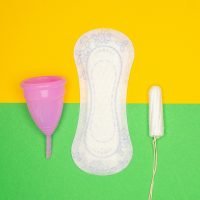Read about all things period and have your period questions answered...
Getting your period is a constant monthly event usually from teenage years right through to your middle years. Understanding your period is a lot more that just deciding which pad or tampon to use. Find out more about periods in our Q&A and period blog to have your period questions answered.
Period Q&A
Is my period normal? Which pad, liner or tampon should I use? Applicator tampons vs regular tampons? Plus more! Get Answers to Common Period Questions with Wonder’s Q&A.
Over a month, or so, you have your ‘menstrual cycle’. During this cycle, the lining of the uterus thickens to prepare for a fertilized egg if a woman becomes pregnant. If the egg isn’t fertilized, the thickened lining breaks down and is released by your body as blood through your vagina. This is your period, or what’s known as menstruation. Periods vary — the flow may be light, moderate or heavy, and can vary in length from about 2 to 7 days.
A ‘menstrual cycle’ is different for every woman. Some women will have a long cycle, while others a short cycle. A period is counted from the first day of one period to the first day of the next period, and you might get one anywhere from every 21 to 35 days. When you first start menstruating, you might get one period, then another two weeks later, but then not get one for a couple of months. This is very normal, and it may take around a year to get into a regular pattern. To work out the length of your cycle, mark down in your diary the date your period starts, or download an app on your phone to help track your cycle. Knowing your cycle means that you can determine when your next one so you can be prepared.
The average period lasts somewhere between 3 to 5 days, but for some, it may be a bit longer, or a bit shorter, especially when you first get it. In fact, it may take around a year for your body to establish a regular cycle.
PMS stands for ‘premenstrual syndrome’. PMS includes a range of symptoms that women may suffer from a week or so before getting a period. Symptoms start before your period comes and usually disappear during your period. Some of the most common PMS symptoms are:
- Cramps (pain in your lower back or tummy)
- Bloating (tummy feels puffed up)
- Breakouts (pimples)
- Tender breasts
- Tiredness
- Mood swings (your emotions may change quickly, or you feel down, anxious or angry).
When you first get your period, your cycle might be quite irregular. Over time, and with age, your cycle usually becomes shorter and more regular. If your period has been regular and suddenly changes it may be due to:
- Medical issues, such as polycystic ovaries or thyroid problems
- Extreme weight loss/gain
- Smoking or drinking too much alcohol
- Stress
- Too much physical activity
- Working shift work
- Chronic or serious illnesses
- Some medicines.
If something doesn’t feel quite right about why your period is irregular, or if your period doesn’t stop, make sure you see your GP.
Pad or tampon? Super or regular? Firstly, think about what you might be doing that day. If you are going swimming, you will definitely need to use a tampon. If not, you can use either, or a combination to make sure you are protected from leaks. Next, think about how heavy your flow is that day. Super offers high absorbency, which is great for days 1 and 2 when your period is heavier. Regular offers medium absorbency and is usually perfect from day 3 and on. Sometimes on the last days, when your period is very light, you might even just need a liner.
Period Q&A
Is my period normal? Which pad, liner or tampon should I use? Applicator tampons vs regular tampons? Plus more! Get Answers to Common Period Questions with Wonder’s Q&A.
What is a period?
Over a month, or so, you have your ‘menstrual cycle’. During this cycle, the lining of the uterus thickens to prepare for a fertilized egg if a woman becomes pregnant. If the egg isn’t fertilized, the thickened lining breaks down and is released by your body as blood through your vagina. This is your period, or what’s known as menstruation. Periods vary — the flow may be light, moderate or heavy, and can vary in length from about 2 to 7 days.
How often do you get a period?
A ‘menstrual cycle’ is different for every woman. Some women will have a long cycle, while others a short cycle. A period is counted from the first day of one period to the first day of the next period, and you might get one anywhere from every 21 to 35 days. When you first start menstruating, you might get one period, then another two weeks later, but then not get one for a couple of months. This is very normal, and it may take around a year to get into a regular pattern. To work out the length of your cycle, mark down in your diary the date your period starts, or download an app on your phone to help track your cycle. Knowing your cycle means that you can determine when your next one so you can be prepared.
How long is a period?
The average period lasts somewhere between 3 to 5 days, but for some, it may be a bit longer, or a bit shorter, especially when you first get it. In fact, it may take around a year for your body to establish a regular cycle.
What is PMS?
PMS stands for ‘premenstrual syndrome’. PMS includes a range of symptoms that women may suffer from a week or so before getting a period. Symptoms start before your period comes and usually disappear during your period. Some of the most common PMS symptoms are:
- Cramps (pain in your lower back or tummy)
- Bloating (tummy feels puffed up)
- Breakouts (pimples)
- Tender breasts
- Tiredness
- Mood swings (your emotions may change quickly, or you feel down, anxious or angry).
Why is my period irregular?
When you first get your period, your cycle might be quite irregular. Over time, and with age, your cycle usually becomes shorter and more regular. If your period has been regular and suddenly changes it may be due to:
- Medical issues, such as polycystic ovaries or thyroid problems
- Extreme weight loss/gain
- Smoking or drinking too much alcohol
- Stress
- Too much physical activity
- Working shift work
- Chronic or serious illnesses
- Some medicines.
If something doesn’t feel quite right about why your period is irregular, or if your period doesn’t stop, make sure you see your GP.
Which pad or tampon should I use?
Pad or tampon? Super or regular? Firstly, think about what you might be doing that day. If you are going swimming, you will definitely need to use a tampon. If not, you can use either, or a combination to make sure you are protected from leaks. Next, think about how heavy your flow is that day. Super offers high absorbency, which is great for days 1 and 2 when your period is heavier. Regular offers medium absorbency and is usually perfect from day 3 and on. Sometimes on the last days, when your period is very light, you might even just need a liner.
Photo credits:
Photo of period products by Reproductive Health Supplies Coalition on Unsplash
Photo of women by Katarzyna Grabowska on Unsplash
Photo of mum and baby by Kelly Sikkema on Unsplash










